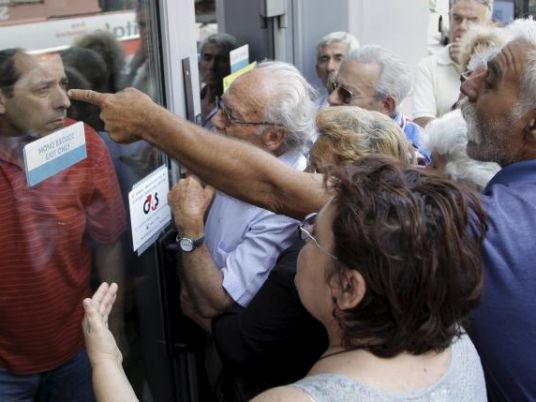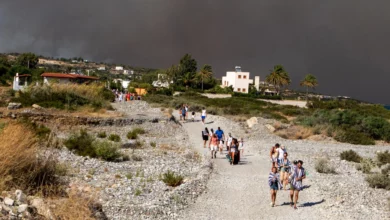
Greeks struggled to adjust to shuttered banks, closed cash machines and a climate of rumours and conspiracy theories on Monday as a breakdown in talks between Athens and its creditors plunged the country deep into crisis.
Prime Minister Alexis Tsipras, who blindsided creditors by calling a referendum on the austerity cuts in the aid package proposed by the creditors, appeared on television on Sunday night to announce capital controls to prevent banks from collapsing.
Their imposition capped a dramatic weekend for Greece that has pushed the country towards a likely default on 1.6 billion euros ($1.77 billion) of International Monetary Fund loans on Tuesday and closer to an exit from the euro currency bloc.
French President Francois Hollande appealed to Tsipras to return to the negotiating table and German Chancellor Angela Merkel said she was willing to talk to the 40-year-old Greek leader if he wanted.
"There are a few hours before the negotiation is closed for good," Hollande said after a cabinet meeting on Greece.
But with Greece's bailout programme expiring in less than 48 hours, hopes of a last-minute breakthrough were fading fast. Greeks – used to lengthy talks with creditors before a eleventh-hour deal materializes – were left stunned.
"I can't believe it," said Athens resident Evgenia Gekou, 50, on her way to work. "I keep thinking we will wake up tomorrow and everything will be OK. I'm trying hard not to worry."
European officials sent confusing signals about their next move. A spokesman for the European Commission told French radio that Brussels would not make any new proposals on Monday, appearing to contradict comments by EU Economics Commissioner Pierre Moscovici. He said a new offer was forthcoming and that the two sides were "only a few centimetres" away from a deal.
European bank shares fell sharply on Monday. Top banks in Spain, France and Germany were down more than 6 percent as the risk of a spillover to banks in other peripheral euro zone countries spooked investors.
The Greek government will keep banks shut at least until after July 5, the date of the referendum, and withdrawals from automated teller machines were limited to 60 euros a day when they reopened at midday. The stock exchange will also stay shut.
After months of talks, Greece's exasperated European partners have put the blame for the crisis squarely on Tsipras's shoulders.
The creditors wanted Greece to cut pensions and raise taxes in ways that Tsipras has long argued would deepen one of the worst economic crises of modern times in a country where a quarter of the workforce is already unemployed.
As Tsipras announced the emergency measures late on Sunday, there were long queues outside ATMs and petrol stations as people raced to take out cash before it was too late. Lines of over a dozen people formed at ATMs when they reopened on Monday.
"I've got five euros in my pocket, I thought I would try my luck here for some money. The queues in my neighbourhood were too long yesterday," said plumber Yannis Kalaizakis, 58, outside an empty cash machine in central Athens on Monday.
"I don't know what else to say. It's a mess."
"DRAMATIC HOURS"
Newspapers splashed pictures of long lines outside cash machines on their front page. The Nafetemporiki daily headlined Monday's edition "Dramatic hours" while the Ta Nea daily simply said: "When will the banks open".
The conservative-leaning Eleftheros Typos newspaper accused Tsipras of announcing the referendum as a ruse to tip the country into early elections in the hopes of winning them.
"Mr Tsipras's decision to call a referendum and a possible euro exit constitutes a premeditated crime," it said in an editorial. "It is clear that Mr Tsipras has lost the trust of citizens. That's obvious from the queues at ATMs and petrol stations, and it will become obvious at next Sunday's ballot."
As rumours flew about, dozens of pensioners queued outside at least two offices of the National Bank of Greece (NBGr.AT) on Monday after hearing they could withdraw pensions from some branches. They were turned away, Reuters photographers said.
"I've worked all my life, only to wake up one morning to a disaster like this," said one shop owner, who was there to collect his wife's pension.
Despite the financial shock, parts of daily life went on as normal, with shops, pharmacies and supermarkets in the city opening and Greeks meeting to discuss their country's fate at cafes and restaurants. Tourists gathered as usual to watch the changing of the presidential guard outside parliament.
A rally called by Tsipras's Syriza party to protest against austerity measures and urge voters to say "No" in the referendum on bailout terms is expected later on Monday.
Officials around Europe and the United States made a frantic round of calls and organised meetings to try to salvage the situation.
US President Barack Obama called Merkel, and senior US officials including Treasury Secretary Jack Lew, who spoke to Tsipras, urged Europe and the IMF to come up with a plan to hold the single currency together and keep Greece in the euro zone.
"While the programme is active until Tuesday, they aren't providing the necessary liquidity for Greek banks just to blackmail and to terrorize us," Administrative Reforms Minister George Katrougalos told Antenna television.
"If we vote a yes, they will demolish pensions, you will have to pay for medicare in public hospitals. When your kids can't go to school you will say 'thanks' and they will say 'you asked for it'.
"But if you say no you have the ability to fight for a better future."




